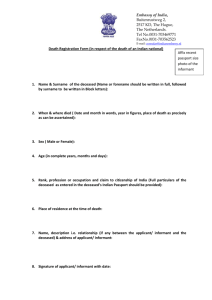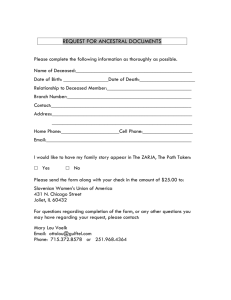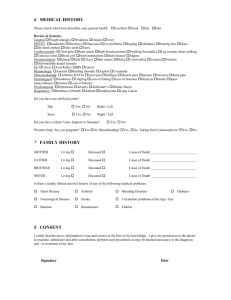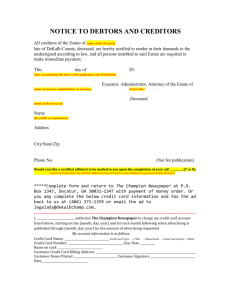Challenging Wills 2 - Peter Dawson & Associates
advertisement
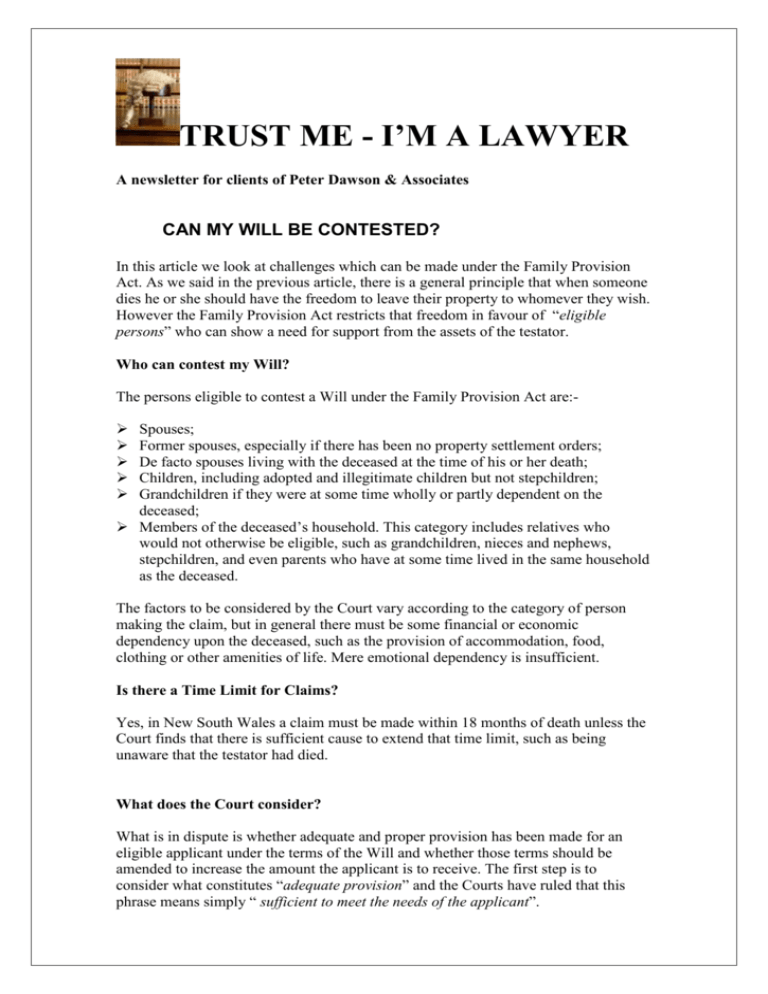
TRUST ME - I’M A LAWYER A newsletter for clients of Peter Dawson & Associates CAN MY WILL BE CONTESTED? In this article we look at challenges which can be made under the Family Provision Act. As we said in the previous article, there is a general principle that when someone dies he or she should have the freedom to leave their property to whomever they wish. However the Family Provision Act restricts that freedom in favour of “eligible persons” who can show a need for support from the assets of the testator. Who can contest my Will? The persons eligible to contest a Will under the Family Provision Act are: Spouses; Former spouses, especially if there has been no property settlement orders; De facto spouses living with the deceased at the time of his or her death; Children, including adopted and illegitimate children but not stepchildren; Grandchildren if they were at some time wholly or partly dependent on the deceased; Members of the deceased’s household. This category includes relatives who would not otherwise be eligible, such as grandchildren, nieces and nephews, stepchildren, and even parents who have at some time lived in the same household as the deceased. The factors to be considered by the Court vary according to the category of person making the claim, but in general there must be some financial or economic dependency upon the deceased, such as the provision of accommodation, food, clothing or other amenities of life. Mere emotional dependency is insufficient. Is there a Time Limit for Claims? Yes, in New South Wales a claim must be made within 18 months of death unless the Court finds that there is sufficient cause to extend that time limit, such as being unaware that the testator had died. What does the Court consider? What is in dispute is whether adequate and proper provision has been made for an eligible applicant under the terms of the Will and whether those terms should be amended to increase the amount the applicant is to receive. The first step is to consider what constitutes “adequate provision” and the Courts have ruled that this phrase means simply “ sufficient to meet the needs of the applicant”. However “adequate provision” may not be “proper”, and the test is what is appropriate having regard to: The financial position of the applicant, including his or her health, earning capacity, capital assets and savings and liabilities. If a person is capable of adequately providing for his or her own maintenance education and advancement in life then in principle there is no need for provision to be made from the deceased’s estate. The size and nature of the estate. There is no doubt that a court can be more generous when a large amount is involved, and although the provision for an applicant may be sufficient, it may be ruled to be inadequate. If however there is only a small estate the court will be reluctant to disturb the testator’s wishes. the totality of the relationship between the applicant and the deceased, and the relationship between the deceased and other beneficiaries and applicants. This includes factors such as personal services rendered in the declining years of the testator’s life, working in the family business, or the receipt by one beneficiary of a substantial benefit during the life of the deceased. The decision requires a balancing of all of the circumstances of the case. What if the applicant is undeserving? Occasionally cases arise where an eligible applicant has a prima facie claim but there is evidence of misconduct towards the deceased, or character or conduct that shows that the applicant’s need for provision is due to his or her own default. The Court may rule that such action to be “conduct disentitling” the applicant from obtaining provision from the estate. Examples are financial mismanagement due to drug or alcohol abuse, or estrangement from the deceased for long periods of time resulting in there being no longer any relationship between them. Can my Executor settle the Claim? A Family Provision matter can be settled by mediation or negotiation., and in such cases the approval of the court will be sought to ensure that the amendment of the testators wishes is fair to all known beneficiaries. For more information call us for an appointment at our offices at 5/500 Old Northern Road Round Corner or 1/271 Beames Avenue Mt Druitt

